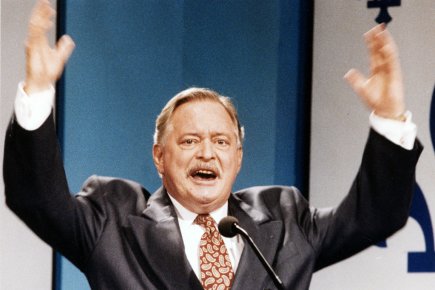The last time Québec held a referendum on independence in 1995, Jacques Parizeau (pictured above in 1995) was the leader of the sovereigntist Parti québécois (PQ).![]()
![]()
With just over a week to go until Québec votes on Sept. 4 for a new Assemblée nationale, Parizeau, in a sharp rebuke to PQ leader Pauline Marois, endorsed the smaller, more stridently sovereigntist Option nationale, a party formed in 2011 by former PQ legislator Jean-Martin Aussant. His move comes with polls showing the PLQ and the PQ see-sawing in the 30% to 35% range for the lead in the election
Marois took the news gracefully, but the Globe and Mail reports that the Parizeau’s snub could jeopardize Marois’s effort to win power. Normally, it doesn’t speak well of a party leader when a former party leader endorses a rival.
In this instance, I’m not sure that it harms Marois. To the contrary, it emphasizes the not-so-subtle secret of Marois’s PQ leadership: she’s more interested in forming a government than pushing sovereignty. That’s the very compliant Aussant aired when he formed Option nationale.
If she wins the election, which is as much a referendum on Charest and his government than anything else, it will be because she has emphasized any number of issues — corruption, strengthening education and health care, promoting Québec industry — to the relative exclusion of sovereignty.
Quebeckers only narrowly rejected independence by a razor-thin margin in 1995, but in the years since that referendum, stronger Québec-federal relations, a surprisingly deft touch by Canadian prime minister Stephen Harper and, for nearly a decade, a strong federalist premier in Jean Charest, leader of the Parti libéral du Québec (Liberal Party, or PLQ) have eroded the thirst for a separate Québec.
Today, polls show that Quebeckers, by a fairly substantial margin, favor remaining a province of Canada, in no small part due to the transfer of federal funds that so benefits Québec. Charest, Harper and other federal figures have so successfully stroked Québec that in the last general election, the Bloc québécois, the PQ’s federal analogue, which had held nearly two-thirds of all federal ridings since 1993, was nearly wiped out, much to the benefit of the social progressive New Democratic Party.
So while Québec remains a leftist bastion within Canada (as it has for decades), it is perhaps the least sovereigntist it’s been in decades — maybe even at any time since the so-called “Quiet Revolution” of the 1960s that divided Québec politics into federalist and separatist factions.
For whatever minor role Option nationale will play in the election, the breakout third party has instead been François Legault’s Coalition avenir Québec (CAQ) — Legault, a former PQ minister who supported the referendum, left the PQ last year to form the CAQ precisely because he thought the PQ still emphasized sovereignty too much. In the election, he’s said that while he wouldn’t take independence completely off the table, he will not call a referendum if the CAQ wins.
Throughout the campaign, Marois has soft-pedaled her party’s support of sovereignty, and she’s remained noncommittal to when (and if) she would call a referendum on independence. In fact, she made a bit of news in her debate last Wednesday with Legault when she said she would call a referendum if 15% of Quebeckers wanted it — that was the most specific commitment she’s made so far on a referendum. Marois has said that she will call a referendum if it’s appropriate, but has not provided much guidance as to how she’ll know when such a vote is appropriate. Her stance highlights that the PQ has had a muddled message on sovereignty since it lost the 1995 referendum — certainly it doesn’t want to call another referendum it would lose.
Although you might argue that a sovereign Québec is the PQ’s raison d’être, the PQ has been for decades the predominantly leftist force in Québec provincial politics, and it’s developed its own set of enshrined interests, not all of which have to do with winning power in order to declare an immediate push for an independent Québec. Marois’s goal in this election has been to show that, while independence may be the ultimate goal, there are other priorities for a PQ government — much like the Scottish National Party in the United Kingdom, which has now formed Scotland’s local government since 2007.
So while Marois still has to make sufficiently pro-sovereigntist statements to satisfy the PQ’s sovereignty hawks (which have allowed Charest and Legault to attack her for creating undue uncertainty about Québec’s future), it’s clear that the agenda of any Marois government will not emphasize a new referendum campaign.
Parizeau’s high-profile snub, more than anything else, will emphasize to Québec voters that Marois is dovish in her support for Québec independence, which is precisely the subtle point — as subtle as can be made by a sovereigntist party leader — that Marois has tried to make.
Photo credit to La Presse.

One thought on “Sovereigntist party runs away from sovereignty issue in Québec election”